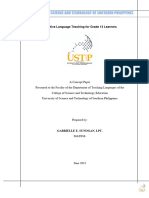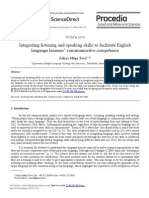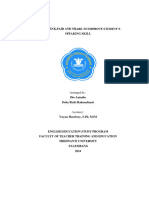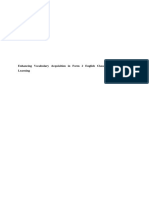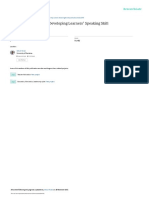Developing Oral Communication Skills THR 2012a498
Developing Oral Communication Skills THR 2012a498
Uploaded by
shareefandabalCopyright:
Available Formats
Developing Oral Communication Skills THR 2012a498
Developing Oral Communication Skills THR 2012a498
Uploaded by
shareefandabalOriginal Title
Copyright
Available Formats
Share this document
Did you find this document useful?
Is this content inappropriate?
Copyright:
Available Formats
Developing Oral Communication Skills THR 2012a498
Developing Oral Communication Skills THR 2012a498
Uploaded by
shareefandabalCopyright:
Available Formats
International Journal of English Literature and Social Sciences (IJELS) Vol-2, Issue-5, Sep - Oct, 2017
https://dx.doi.org/10.24001/ijels.2.5.15 ISSN: 2456-7620
Developing Oral Communication Skills through
Collaborative Learning: Implications for
Nigerian Teachers
Muhammad Mukhtar Aliyu
Department of English, Faculty of Arts and Education, Bauchi State University, Gadau, Bauchi State, Nigeria
Abstract — Considering the need for effective oral environment (Chang & Goswami, 2011; Chen & Goh,
communication skills in academic and professional 2011), large class sizes, insufficient facilities and equipment
successes, this paper reviews oral communication skills and (Aduwa-Ogiegbaen & Iyamu, 2006), teaching approach and
collaborative learning. It highlights some benefits of inadequate emphasis on speaking in the classroom.
collaborative learning. Specifically, it discusses how to The concern of this paper is on the teaching approaches
develop students’ oral communication skills through adopted by Nigerian teachers in teaching oral
collaborative learning. Finally, the paper suggests that communication skills. From experience, most of the
empirical studies should be conducted to provide teachers teaching methods adopted by teachers in Nigeria do not
with methods that would allow students to collaborate in give adequate emphasis on developing the students’ oral
the learning process in order develop their oral communication skills. They mostly dominate the classes
communication skills. It also gives some pedagogical and hardly give the students opportunity to speak or interact
implications for teachers. in the learning process. This hinders the development of the
Keywords— Collaborative learning, Nigeria, oral students’ oral communication skills because one cannot
communication skills. learn to speak through listening only but through the
practice of speaking (Derakhshan, Tahery, & Mirarab,
I. INTRODUCTION 2015). As for the listening skills, only a few students pay
Oral communication skills which include speaking and much attention to what the teacher says while teaching
listening (Ogunsiji, 2004) are indispensable life skills. because they know they would not be asked to participate or
These skills have been used to communicate ideas long contribute based on what the teachers said.
before the development of a writing system. Ability to From the general observation of teaching of English
master and use the skills effectively influences one’s level Language in Nigeria, there is almost a complete neglect of
of success in different life endeavours, particularly in the listening and speaking skills from primary to the tertiary
current era of globalisation. Therefore, the place of listening levels of education. Students are not given enough
and speaking in teaching any language cannot be opportunities to practice oral expression or listening
overemphasised since the goal is to enhance effective comprehension in their classrooms. This hinders them from
communication. However, acquiring these important skills becoming competent communicators. In comparison with
poses many challenges to learners especially when learning reading and writing skills, in most Nigerian educational
a second (L2) or foreign language (FL). In Nigeria for institutions, reading and writing are taught as courses on
instance, English is used as the official language and it has their own but in many cases, no course is assigned
been a compulsory course in Nigerian educational specifically for the teaching of speaking or listening skills.
institution for decades. The role the English language plays Speaking and listening skills are only learned while learning
in the country necessitates the need for Nigerian students to other courses. Even in rare cases where a course is assigned
be proficient in their oral communication in the language: for the teaching of speaking and listening skills, students are
speaking, listening. However, there have been complaints only told about the skills, about how to become effective
from teachers, parents and government on the Nigerian listeners or speakers. They are not taught the actual
students’ inability to communicate effectively using correct speaking or listening. They are not engaged in the process
English expressions in their speaking. or allowed to practice the actual speaking or listening in the
Various factors hinder the students from developing their classroom.
oral communication skills in English which include These are some of the challenges faced by Nigerian
insufficient teaching hours for English, unskilled teachers, students in acquiring speaking and listening skills.
students’ poor proficiency, non-English speaking Therefore, this paper suggests that collaborative learning
www.ijels.com Page | 127
International Journal of English Literature and Social Sciences (IJELS) Vol-2, Issue-5, Sep - Oct, 2017
https://dx.doi.org/10.24001/ijels.2.5.15 ISSN: 2456-7620
could be employed in teaching all subjects to allow the III. COLLABORATIVE LEARNING IN SECOND
students to develop their oral communication skills because L2 LEARNING
it creates a context where all students can be engaged and Collaborative learning is described as an instructional
use the language in the learning process. Alternatively, this methodology that uses a small group of students or pair in
paper also recommends that there is a need for the classroom activities (Storch, 2002). It provides
introduction of courses specifically for the teaching opportunities for students to develop skills that are needed
speaking and listening skills. in today’s world through group interactions while working
with others (Imel, 1989; Kerka, 1990). In the learning
II. ORAL COMMUNICATION SKILLS process, learners are expected to act as resources for each
Oral communication skills comprise listening and speaking other within a group. From the literature, collaborative
skills (Ogunsiji, 2004). They are described as the most learning has been supported theoretically and pedagogically
important language skills because they are the commonest by various studies. Theoretically, collaborative learning is
channels through which most people encounter language based on social constructivism of Vygotsky (1978) who
and learn to use and interpret feelings or messages suggests that human development is inherently a socially
(Johnstone and Milne 1995). They always go hand-in-hand, situated activity. According to Vygotsky, a novice child’s
since one is dependent on the other for effective cognitive development arises in social interaction with a
communication in most cases. It is asserted that listening more able member of society. The more able member who
takes about 40-50%; speaking, 25-30% of the total time one may be an expert provides the novice with the appropriate
spends on communication. On the other hand, reading takes level of assistance, which stretches the novice beyond
only 11-16%; and writing, about 9% (Gilakjani and his/her current level towards their potential level of
Ahmadi, 2011). Thus, effective communication consists of development.
the ability to produce well-articulated speech, as well as From the pedagogical perspectives, collaborative learning
ability to receive (listen). has been supported by the communicative approach to
Despite the importance of speaking in an educational second language instruction and its emphasis on providing
setting, many students experience a feeling of uneasiness learners with opportunities to use the L2. Therefore, based
and anxiety when having to speak in a second or foreign on these perspectives, learners should be encouraged to
language (Suleimenova, 2013). Nigerian students are also participate in activities which foster interaction and co-
no exception. Many Nigerian students feel nervous to speak construction of knowledge
English to teachers and peers for fear of being mocked Various researchers have identified numerous benefits of
should they commit errors of grammar or pronunciation collaborative learning which include developing social
(Taiwo, 2013). Another factor that affects the students’ skills, psychological skills, critical thinking skills and
spoken English is the excessive use of mother tongue in- academic achievement (Laal & Ghodsi, 2012).
and outside the classrooms (Oyinloye, 2002). Collaborative learning also fosters the development of
In addition, most of the English textbooks emphasise more interpersonal relationships and reduces anxiety. It develops
on written English than the spoken one which makes oral communication skills (Yager, Johnson, & Johnson,
students memorise vocabulary instead of developing 1985). It promotes mutual interaction, negotiations and
speaking skills (Taiwo, 2013). These factors hinder the sharing of expertise among learners (Yong, 2010). Lastly, it
development of the students’ oral communication skills. To prepares students for the challenges in the workplace, where
develop oral communication skills, students need to collaborative activities and problem-solving are key
participate in the classroom’s oral tasks (Derakhshan, elements of many careers.
Tahery, & Mirarab, 2015). Therefore, this paper suggests In the current educational system in Nigeria, competition is
that adopting collaborative learning method may help the valued over cooperation. Students always compete with one
students to develop their oral communication skills. For another instead of cooperating with one another to achieve
instance, it would allow the students to overcome their success. By incorporating collaborative learning method in
speaking anxiety and nervousness since the interaction is teaching, the students may develop their oral
among peers. In addition, it would help teachers to manage communication skills. Sharing and exchanging ideas among
their large class and give effective feedback since the peers might be easier since they are familiar to one another.
students are grouped into smaller groups. When students are working in pairs or in small groups, one
partner verbalises his/her answers while the other listens;
ask questions or comments based on what he/she has heard.
Clarification and explanation of one’s answer is a very
important part of the collaborative process and represents a
higher-order thinking skill. As students work in groups and
www.ijels.com Page | 128
International Journal of English Literature and Social Sciences (IJELS) Vol-2, Issue-5, Sep - Oct, 2017
https://dx.doi.org/10.24001/ijels.2.5.15 ISSN: 2456-7620
express themselves orally, they might minimise their [8] Dewey, J. (2009). Democracy and education: An
anxiety and become fluent speakers. Teachers might also introduction to the philosophy of education. New
find it easier to control large classes and to monitor the York: Cosimo Classics.
students’ learning process. It may also allow them to give [9] Ezeanyanike, P. A. (2013). Assessing benefits of
feedback to the students’ learning. collaborative learning environment for quality higher
education in Nigeria. Journal of Educational and
IV. CONCLUSION AND RECOMMENDATIONS Social Research, 3(6), 85-94.
This paper highlights the benefits of collaborative learning [10] Gilakjani, A.P. & Ahmadi, M. R. (2011). A Study of
which include developing students’ oral communication Factors Affecting EFL Learners' English Listening
skills, social skills and academic skills. The paper also Comprehension and the Strategies for Improvement.
stresses the need to adopt collaborative learning method in Journal of Language Teaching and Research, 2(5)
our classrooms in order to develop students’ oral 977-988.
communication skills. Therefore, the following are some [11] Laal, M. & Ghodsi, S. M. (2012). Benefits of
recommendations for teachers and researchers: collaborative learning. Procedia - Social and
Researchers should conduct empirical studies to Behavioral Sciences 31 (2012) 486 – 490.
investigate the effectiveness of collaborative learning [12] Leonard, P. E., & Leonard, L.J. (2001). The
in developing oral communication skills collaborative prescription: Remedy or reverie?
The students should be assigned to work in pairs or International Journal of Leadership in Education,
smaller groups to help one another in- or outside their 4(4), 383–99.
classrooms. Alternatively, [13] Lubega, S. 1987. Cultivating effective listening and
Teachers should engage the students and give them speaking skills. In Adegbija, E. (Ed)
enough opportunity to actively participate in the [14] Effective study skills and use of English. Ilorin: The
classroom General Studies and General Awareness Division,
Teachers should probe the students and make every University of Ilorin. 174-197.
student contribute during the group discussions [15] Maduekwe, A.N. 2007. Principles and practice of
through asking open-ended questions. teaching English as a second language. Lagos:
Vitaman Educational Books.
REFERENCES [16] Mayer, R. E. (2004). Should there be a three strikes
[1] Aduwa-Ogiegbaen, S., & Iyamu, E. (2006). Factors rule against pure discovery? The case for guided
affecting quality of English language teaching and methods of instruction. American Psychologist, 59(1),
learning in secondary schools in Nigeria. College 14–19.
Student Journal, 40(3), 495-504. [17] McDonough, J., & Shaw, C. (2003). Materials and
[2] Austin, J. E. (2000). Principles for partnership. Methods in ELT: A Teacher’s Guide (2nd ed.). Oxford:
Journal of Leader to Leader. 18, 44-50. Blackwell Publishing.
[3] Bloom, B. S. (Ed.) (1956). Taxonomy of educational [18] Neo, M., & Neo, T.-K. (2009). Engaging students in
objectives. Handbook 1: Cognitive domain. White multimedia-mediated constructivist learning: Students’
Plains, NY: Longman. perceptions. Educational Technology and Society,
[4] Bruner, J. (1985). Vygotsky: A historical and 12(2), 254–266.
conceptual perspective. In J. V. Wetsch (Ed.), Culture, [19] Ogunsiji, A. (2004). Developing the basic language
communication, and cognition: Vygotskian skills for communicative competence in learners of
perspectives (pp. 21–34). London: Cambridge English as a second language. IBADAN Journal of
University Press. English Studies, (1),19-34.
[5] Chang, M., & Goswami, J. S. (2011). Factors affecting [20] Olanrewaju, A. T. (2016). Developing learners’
the implementation of communicative language communicative language skills in English as panacea
teaching in Taiwanese college English classes. English for unemployment in Nigeria. International Journal of
Language Teaching, 4(2), 3-12. English Language, Literature and Humanities, iv (v),
[6] Chen, Z., & Goh, C. (2011). Teaching oral English in 26-37.
higher education: Challenges to EFL teachers. [21] Panitz, T. (1999). Benefits of Cooperative Learning in
Teaching in Higher Education, 16(3), 333-345. Relation to Student Motivation", in Theall, M. (Ed.)
[7] Derakhshan, A., Tahery, F., & Mirarab, N. (2015). Motivation from within: Approaches for encouraging
Helping adult and young learners to communicate in faculty and students to excel, New directions for
speaking classes with confidence. Mediterranean teaching and learning. San Francisco, CA; USA.
Journal of Social Sciences, 6(2), 520-525. Josey-Bass publishing.
www.ijels.com Page | 129
International Journal of English Literature and Social Sciences (IJELS) Vol-2, Issue-5, Sep - Oct, 2017
https://dx.doi.org/10.24001/ijels.2.5.15 ISSN: 2456-7620
[22] Panitz, T. (1996). A Definition of collaborative vs
cooperative learning. Deliberations, London
Metropolitan University; UK., Retrieved 5 Nov. 2011,
from:
http://www.londonmet.ac.uk/deliberations/collaborativ
e-learning/panitz-paper.cfm.
[23] Panitz, T. & Panitz, P. (1996). Assessing students and
yourself using the one minute paper and observing
students working cooperatively. Cooperative Learning
and College
TeachingNewsletter,6(3),Retrieved,5,Nov,2011,from:
http://home.capecod.net/~tpanitz/tedsarticles/Assessm
ent.htm.
[24] Slavin, R. E. (1989). Research on cooperative
learning: An international perspective. Scandinavian
Journal of Educational Research, 33(4), 231–243.
[25] Storch N (2005). Collaborative writing: product,
process, and students’ reflections. Journal for Second
Language Writing 14(3), 153-73.
[26] Suleimenova, Z. (2013). Speaking anxiety in a foreign
language classroom in Kazakhstan. Proceedings of 3rd
World Conference on Learning, Teaching and
Educational Leadership Procedia - Social and
Behavioral Sciences 93 (2013), 1860 –1868.
[27] Totten, S., Sills, T., Digby, A., & Russ, P. (1991).
Cooperative learning: A guide to research. New York:
Garland.
[28] Taiwo, F. (2013). An appraisal of spoken English
language in Nigeria. Global Journal of Curriculum
Studies and Instruction. Vol. 1 (1), 054-059.
[29] Vygotsky, L. (1980). Mind in society: The
development of higher psychological processes.
Cambridge, MA: Harvard University Press.
[30] Yager, S., Johnson, D.W. & Johnson, R.T. (1985).
Oral discussion groups-to-individual transfer, and
achievement in cooperative learning groups. Journal
of Educational Psychology, 77(1), 60-66.
www.ijels.com Page | 130
You might also like
- Canadian Human Resource Management A Strategic Approach Canadian 10th Edition by Schwind Das Wagar and Fassin ISBN Test BankDocument42 pagesCanadian Human Resource Management A Strategic Approach Canadian 10th Edition by Schwind Das Wagar and Fassin ISBN Test Bankbennie100% (44)
- Developing Oral Communication Skills With Cover Page v2Document5 pagesDeveloping Oral Communication Skills With Cover Page v2Khadija SaqibNo ratings yet
- 4297 12275 1 PBDocument11 pages4297 12275 1 PBNurnaNingsihNo ratings yet
- L2Challenges PUJournal 2018Document25 pagesL2Challenges PUJournal 2018nghiemthuy92No ratings yet
- Sunogan Concept Paper Revised 1Document18 pagesSunogan Concept Paper Revised 1Gabrielle SunoganNo ratings yet
- English Oral Discourse Competence of College Students: A Focus On Factors AssessmentDocument12 pagesEnglish Oral Discourse Competence of College Students: A Focus On Factors AssessmentPsychology and Education: A Multidisciplinary JournalNo ratings yet
- Development and Validation of Technology-Enhanced Module For Teaching Oral Communication in ContextDocument17 pagesDevelopment and Validation of Technology-Enhanced Module For Teaching Oral Communication in ContextPsychology and Education: A Multidisciplinary JournalNo ratings yet
- Dialogic Teaching Strategy GamalDocument16 pagesDialogic Teaching Strategy Gamallearn English with itep jammal جيمسبير الإنجليزيةNo ratings yet
- The Effect of Gallery Walk Strategy On Students' Speaking SkillDocument11 pagesThe Effect of Gallery Walk Strategy On Students' Speaking SkillNisfiyatul LailiyahNo ratings yet
- English Speaking Skills: The Plight of Maguindanaon Students A PhenomenologyDocument9 pagesEnglish Speaking Skills: The Plight of Maguindanaon Students A PhenomenologyPsychology and Education: A Multidisciplinary JournalNo ratings yet
- A Review of Affective Strategy and Social StrategyDocument9 pagesA Review of Affective Strategy and Social Strategyshaimaa HassanNo ratings yet
- Jurnal 3 DDocument10 pagesJurnal 3 DLina UmanailoNo ratings yet
- Promoting Oral Production ThroughDocument9 pagesPromoting Oral Production ThroughMusiin WaloejoNo ratings yet
- Classroom Discourse Failure Among AlgeriDocument17 pagesClassroom Discourse Failure Among AlgeriYASSINE ELMALKINo ratings yet
- Ipad GamalDocument33 pagesIpad Gamallearn English with itep jammal جيمسبير الإنجليزيةNo ratings yet
- 7431-Article Text-30192-1-10-20231106Document8 pages7431-Article Text-30192-1-10-20231106Irfan HimmaturrafiNo ratings yet
- 740 1072 1 SMDocument10 pages740 1072 1 SMAnita KurniasihNo ratings yet
- Paraphrasing Techniques For Improving Students Speaking AbilityDocument14 pagesParaphrasing Techniques For Improving Students Speaking AbilityackremananisaNo ratings yet
- (Annisa Putri Hadiningsih) Using the Situational Role Play Technic to Teach Speaking Skill in Junior High SchoolDocument4 pages(Annisa Putri Hadiningsih) Using the Situational Role Play Technic to Teach Speaking Skill in Junior High Schoolhilma suryaniNo ratings yet
- Blended Learning in An English Listening and Speaking Course: Freshmen's Voice and ChoiceDocument7 pagesBlended Learning in An English Listening and Speaking Course: Freshmen's Voice and ChoiceBunny KhaNo ratings yet
- The Role of Teachers in Developing LearnDocument17 pagesThe Role of Teachers in Developing LearnwisepupilNo ratings yet
- Reviewed - Ijhss - Format-Comprehend Verbalization Through "Virtual Platform"Document6 pagesReviewed - Ijhss - Format-Comprehend Verbalization Through "Virtual Platform"iaset123No ratings yet
- Teaching Basic Vocabulary For Kindergarten Students by Using Communicative Language Teaching Method Via GamesDocument8 pagesTeaching Basic Vocabulary For Kindergarten Students by Using Communicative Language Teaching Method Via GamesezrasisilyanfNo ratings yet
- 1 s2.0 S1877042810023360 MainDocument6 pages1 s2.0 S1877042810023360 MainHazwan AsyrafNo ratings yet
- Andita Apriliasari Car Research ProposalDocument12 pagesAndita Apriliasari Car Research ProposalanditaagrandeeNo ratings yet
- Referensi Jurnal B.inggris 1Document7 pagesReferensi Jurnal B.inggris 1alisatus sina aNo ratings yet
- Group 11_5C_Teaching SpeakingDocument34 pagesGroup 11_5C_Teaching SpeakingNUR IHSAN NUR IHSANNo ratings yet
- 1.2. Background To The StudyDocument34 pages1.2. Background To The StudySaimone Helaque LucasNo ratings yet
- 16Document32 pages16Yuni MarselaNo ratings yet
- Teaching Speaking - PaperDocument6 pagesTeaching Speaking - PaperMiku HatsuneNo ratings yet
- Factors Affecting Low English Speaking Proficiency Among Secondary School Efl Learners in Libya Scoping ReviewDocument16 pagesFactors Affecting Low English Speaking Proficiency Among Secondary School Efl Learners in Libya Scoping ReviewFree “FREE EAGLE” EagleNo ratings yet
- Students' Perceptions and Challenges in Improving Speaking Ability in Public and Private UniversityDocument4 pagesStudents' Perceptions and Challenges in Improving Speaking Ability in Public and Private UniversityRussel J. CorpuzNo ratings yet
- Sonsona Developing SpeakingDocument13 pagesSonsona Developing SpeakingLan Hương NguyễnNo ratings yet
- Gamification and Cross Over Learning A Way To Improve The Speaking Skills of Students in EnglishDocument14 pagesGamification and Cross Over Learning A Way To Improve The Speaking Skills of Students in EnglishMariter PidoNo ratings yet
- Paper Think Pair and Share For Practice Speaking SkillDocument13 pagesPaper Think Pair and Share For Practice Speaking Skillzkc8ygk5c9No ratings yet
- Mini Research The English Teachers Strategies in Teaching Speaking SkillDocument18 pagesMini Research The English Teachers Strategies in Teaching Speaking SkillEko Sahputra Al fatihNo ratings yet
- ENHANCING_ELEVENTH_GRADE_STUDENTS_SPEAKING_SKILLS (1)Document17 pagesENHANCING_ELEVENTH_GRADE_STUDENTS_SPEAKING_SKILLS (1)michaeallesumatraNo ratings yet
- The Implementation of Contextual Teaching LearningDocument6 pagesThe Implementation of Contextual Teaching Learningamaliah amatullahNo ratings yet
- Enhancing Vocabulary Acquisition in Form 2 English Classes Through Flipped LearningDocument11 pagesEnhancing Vocabulary Acquisition in Form 2 English Classes Through Flipped LearningSyeda IrumNo ratings yet
- The Effectiveness of Content-Based Instruction To Teach Speaking Viewed From Students' CreativityDocument10 pagesThe Effectiveness of Content-Based Instruction To Teach Speaking Viewed From Students' CreativityMiftahul KhairNo ratings yet
- Students' Views On Efl Speaking ProblemsDocument9 pagesStudents' Views On Efl Speaking Problemsari mulianiNo ratings yet
- Board Games in Improving Pupils' Speaking Skills: A Systematic ReviewDocument11 pagesBoard Games in Improving Pupils' Speaking Skills: A Systematic ReviewJames AttreeNo ratings yet
- PAPERICOSEEHSCITEPRESS2019Document8 pagesPAPERICOSEEHSCITEPRESS2019izuskftNo ratings yet
- The Effect of Using Silent Way Method Toward The Students' Speaking PerformanceDocument10 pagesThe Effect of Using Silent Way Method Toward The Students' Speaking PerformanceАнжелика АнжеликаNo ratings yet
- Gingoog City Colleges - Junior High School: Chapter 2-Review of The Related LiteratureDocument7 pagesGingoog City Colleges - Junior High School: Chapter 2-Review of The Related Literatureaccounts 3 lifeNo ratings yet
- State Institute of Islamic Studies (IAIN) Bengkulu, IndonesiaDocument26 pagesState Institute of Islamic Studies (IAIN) Bengkulu, IndonesiaSupriadiNo ratings yet
- Developingoral Communication Skill Through Collaborative LearningDocument1 pageDevelopingoral Communication Skill Through Collaborative LearningSandy Jhane Maneja EsingNo ratings yet
- Board Games in Improving Pupils Speaking Skills ADocument11 pagesBoard Games in Improving Pupils Speaking Skills AThu Huyền BùiNo ratings yet
- The Role of Teachers in Developing Learners' Speaking Skill: April 2015Document18 pagesThe Role of Teachers in Developing Learners' Speaking Skill: April 2015brutedeepaxNo ratings yet
- 1325 4833 1 SMDocument9 pages1325 4833 1 SMRasmikaNo ratings yet
- The Impact of Online Learning in The Development of Speaking SkillsDocument26 pagesThe Impact of Online Learning in The Development of Speaking SkillsMoemoeth INo ratings yet
- 537-Article Text-2121-2-10-20210508Document10 pages537-Article Text-2121-2-10-20210508rihadatulaisiyNo ratings yet
- Bismillah Proposal Pipit Evie AnaDocument16 pagesBismillah Proposal Pipit Evie AnaAbdul RahmanNo ratings yet
- Ajaj I. The Effectiveness of Interactive Teaching StrategiDocument10 pagesAjaj I. The Effectiveness of Interactive Teaching StrategiCaroline CirrusNo ratings yet
- Article (Edited)Document7 pagesArticle (Edited)Aliffiana Mulya HabibahNo ratings yet
- Eight Factors Bringing About Students Speaking DiDocument12 pagesEight Factors Bringing About Students Speaking Dililgates1945No ratings yet
- 2711-Article Text-5308-1-10-20131216Document9 pages2711-Article Text-5308-1-10-20131216andalangantarialamNo ratings yet
- 14.+Siska+Zega+Et - Al 3Document16 pages14.+Siska+Zega+Et - Al 3ahmedmahjeedNo ratings yet
- A Development of Storytelling in Teaching English Speaking at Junior High SchoolDocument6 pagesA Development of Storytelling in Teaching English Speaking at Junior High SchooltwinNo ratings yet
- ADVERTISEMENT_NO_07_2024Document2 pagesADVERTISEMENT_NO_07_2024shareefandabalNo ratings yet
- 1423 - 1 AiouStudio9.ComDocument8 pages1423 - 1 AiouStudio9.ComshareefandabalNo ratings yet
- Training in three District DIK, South Waziristan & TankDocument3 pagesTraining in three District DIK, South Waziristan & TankshareefandabalNo ratings yet
- Day 2 - 8613Document30 pagesDay 2 - 8613shareefandabalNo ratings yet
- 7th DrawDocument2 pages7th DrawshareefandabalNo ratings yet
- 8614 Assingment 2Document14 pages8614 Assingment 2shareefandabalNo ratings yet
- Missing Key FieldsDocument230 pagesMissing Key FieldsshareefandabalNo ratings yet
- PST 1st Tentative Seniority List 2024Document36 pagesPST 1st Tentative Seniority List 2024shareefandabalNo ratings yet
- Tehsil MissingDocument60 pagesTehsil MissingshareefandabalNo ratings yet
- Professional Quality of Life ScaleDocument2 pagesProfessional Quality of Life Scaletanis.payneNo ratings yet
- SMILE L.P Q2 PERDEV WK 2Document3 pagesSMILE L.P Q2 PERDEV WK 2Angelie Espartero Araneta Lobitaña100% (1)
- Wilson Support Center Grief Counseling ReferralsDocument4 pagesWilson Support Center Grief Counseling Referralsjenniferrizzo6No ratings yet
- Study of Criminal BehaviorDocument10 pagesStudy of Criminal BehaviorJeanny Ann BalboaNo ratings yet
- Community Management and RevaluationDocument124 pagesCommunity Management and RevaluationAmelita Gilbuena TrayaNo ratings yet
- HBO Finals ReviewerDocument11 pagesHBO Finals ReviewerRojie Ann AmorNo ratings yet
- Chapter 2Document12 pagesChapter 2jrdodong37No ratings yet
- Human Design Motivation - a Human DesignDocument7 pagesHuman Design Motivation - a Human DesignVanessa CostaNo ratings yet
- Chapter AttitudeDocument16 pagesChapter Attitudeyihunsew betemariamNo ratings yet
- Hal 13-16 Jurnal Nurdianty Fadilla Dan SolehaDocument4 pagesHal 13-16 Jurnal Nurdianty Fadilla Dan SolehaSholeha AlfidaniyyaNo ratings yet
- Healing Trauma Quotes Mindful Colouring SheetsDocument23 pagesHealing Trauma Quotes Mindful Colouring SheetsMara Nagy100% (1)
- Research Thesis - Nouha Salmi Version 21Document71 pagesResearch Thesis - Nouha Salmi Version 21hajar saddiquiNo ratings yet
- Prelim ExamDocument1 pagePrelim ExamJoy ManliguezNo ratings yet
- Sharing vs. Power in Peer GroupDocument6 pagesSharing vs. Power in Peer GroupkaysnookxNo ratings yet
- Art's and EthicsDocument4 pagesArt's and EthicsArifin KhoirNo ratings yet
- Counseling and Psychotherapy-1Document40 pagesCounseling and Psychotherapy-1Sara Kaleem100% (1)
- FGD in CebuDocument2 pagesFGD in CebuLiam Jacque LapuzNo ratings yet
- Organizational Managemnt of Educational Institutions 2 2Document61 pagesOrganizational Managemnt of Educational Institutions 2 2Vina YabutNo ratings yet
- Leadership EthicsDocument3 pagesLeadership EthicsZahid HissamNo ratings yet
- Communication Skills - HandoutDocument18 pagesCommunication Skills - HandoutAdelite sabiriNo ratings yet
- Week 5 Understanding Culture Society and PoliticsDocument18 pagesWeek 5 Understanding Culture Society and PoliticsCharles Benedict FaalaNo ratings yet
- 4-Types of Speech ContextDocument12 pages4-Types of Speech ContextCrisandro VillarbaNo ratings yet
- Pagpadayag 2024Document1 pagePagpadayag 2024DR.Sanson John ryan VillaranteNo ratings yet
- Play Advocacy AssignmentDocument22 pagesPlay Advocacy Assignmentapi-639912537No ratings yet
- School Discipline Policy and ProcedureDocument5 pagesSchool Discipline Policy and ProcedureCatherine Bautist100% (1)
- INTRODUCTIONDocument25 pagesINTRODUCTIONjsjshsbhsbsbs493No ratings yet
- QuestionnaireDocument5 pagesQuestionnaireAlmar C. MiraNo ratings yet
- Role of The TeacherDocument9 pagesRole of The TeacherJim Boy BumalinNo ratings yet
- Mapeh 8 (Tos)Document4 pagesMapeh 8 (Tos)Micah BardajeNo ratings yet





